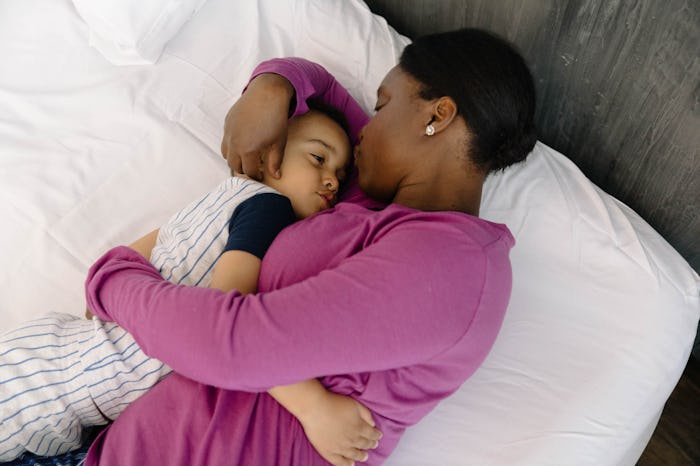Sleep is essential, though it may seem that your child doesn't feel that way. And although commiserating with your fellow sleep-deprived parents can be helpful, but you need solutions. Thankfully, there are many old wives' tales about getting kids to sleep that work.
It's not just great-grandmothers who swear by these tales of promoting slumber. Because these tricks have worked so well, even experts have backed-up their claims of sound sleep. These old wives' tales give parents some really useful tools to work into bedtime routines — everything from reading a book in a soft voice to hypnotizing your tot with a tissue.
When it comes to sleep, parents do what they have to do because everyone needs rest and there aren't enough cups of coffee to help the next day. But really, this is all in the name of getting kids to thrive and grow, and getting a good night's sleep plays a huge part in that.
"When kids get the sleep they need, they may have a lower risk of becoming overweight and developing diabetes, as well as fewer learning problems and attention issues," according to Parents magazine. Sleep, nutrition, and exercise are three of the most important things for kids to be healthy.
For these reasons and more, you may want to consider implementing the following old wives' tales to help your child drift off to dreamland.
1Give Your Child A Warm Bath
An increased body temperature can help relax even the most active kids, according to Health magazine. After your child's bath, her body will have a "rapid cool-down period," which will wear her out to the point of exhaustion. That's the best time to get her into pajamas and cozy in bed to help her fall asleep faster.
2Dim All The Lights
About an hour before bedtime, keep the lights low in the home so your child has a good amount of time to wind down from the excitements of the day. "Melatonin is your hormone of darkness — it won't flow with the lights on," Joyce Walsleben, associate professor at New York University School of Medicine, said in an interview with Health magazine. The dim lights become a signal to your child's brain that it's time for sleep.
3Try Some Lavender
The soothing scent of lavender has a sleepy effect on many kids, according to the National Sleep Foundation (NSF). Why? NSF noted that it naturally lowers heart rate and blood pressure, which can bring on a deeper slumber.
4Play White Noise
According to Romper, some kids are lulled to sleep with white noise, which can come from a dehumidifier in the room or the sound of a fan. This is because the repetitive and soft sound can be hypnotic, and also reminiscent of the soothing sound of mom's heartbeat when in the womb.
5Try The Tissue Trick
This tissue trick video may have swept the internet recently, but the art of getting your kid to sleep with a type of hypnosis has been around for ages. “It’s not the tissue that matters, it’s the motion,” pediatrician Dafna Ahdoot told Yahoo! News. “You’re basically stimulating baby’s ability to self soothe, which calms him down and helps him go to sleep.”
6Be Consistent
Grandma was right — keep bedtime at the same time every night with the same routine and you'll have a sound sleeper. These routines help the "brain shift into sleep mode," Gary Zammit, director of the Sleep Disorders Institute in New York, told Health magazine.
7Keep The Room Dark, Quiet, And Cool
The less stimulus from light, noise, and heat, the more your child will automatically feel ready to go to bed, according to Alaska Sleep Clinic. A dark, quiet, and cool room is a change from the typical awake settings in a home, and that's the type of cue to encourage sleep.
8Read A Bedtime Story
Reading bedtime stories when your kid is all tucked in help your little one become sleepy, especially if you read in a soft tone. "Of all activities, reading printed books appears to be most relaxing," clinical psychologist Michael Gradisar said in an interview in Parents magazine.
9Put Your Child To Bed Before She's Tired
Many kids end up getting more comfortable and able to soothe themselves if they get under the covers just as the yawning starts. This aids in calming the child's central nervous system, Maureen Healy, child development and parenting expert, said in an interview in Psychology Today, and "help(s) move them in the direction of peace and calmness."
10Go To Bed With Your Child
Snuggling in bed with your child to help her fall asleep works, and I know this from personal experience. There may be no place that feels more safe, secure, and relaxing for a child than in mom's arms. The key is to prevent yourself from falling asleep, too, in the few minutes it usually takes for your kid to get into deep slumber.
